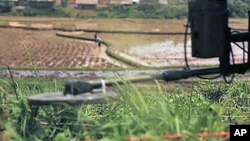Remnants of war, including unexploded ordnance and landmines, are still found in many countries around the world - even decades after conflicts have ended. Those dangers often devastate the lives of local inhabitants, who might not be aware they live in the middle of a minefield.
An international organization that helps clear and destroy weapons left behind in war zones recently screened a documentary called Surviving the Peace, which shows how remnants of a conflict affect people’s lives, even after their country has emerged from war.
In many regions of the globe, surviving a war is followed by surviving the peace. From Laos, where this new documentary was filmed, to Bosnia, Kosovo, Afghanistan, Cambodia, and many other countries, local inhabitants live in daily fear of stepping on a landmine or unexploded ordnance left after a recent conflict.
Surviving the Peace, filmed in Laos in May 2011, reflects a situation found in many countries. It features a young father who is blinded when a bomb left over from the Vietnam War explodes in the fire he is making at his home.
“The guy had most of his face deformed and we were this close [to him]. They allowed us in and we were complete strangers. It felt like we were given a gift from these people to be allowed into their lives,” said filmmaker and cinematographer Rick Gershon.
He said that he and his partner Nathan Golon received a warm welcome in Laos. Even though, as Golon pointed out, the subject they were covering was a sensitive issue.
“We had sensitivities to the fact that here we are in these people’s homes as Americans and these were American bombs that injured people. We never felt the slightest bit of reproach from these people,” Golon.
The documentary was the idea of Patricia Loria, marketing manager for an organization called "Mines Advisory Group," or "MAG."
“The story is powerful not only for Laos, but hopefully it is powerful enough for everyone who really cares about justice, their children, or just helping others,” said Loria.
The United Nations estimates more than 110 million active mines are still scattered in 70 countries around the world. This means one landmine for every 52 people. MAG currently has about 3,500 people working around the world to clear and destroy leftover weapons - most of them local residents. Jennifer Lachman, the executive director of MAG America, said the organization has one main goal.
“… helping people recover and get back on their feet safely and prosperously after conflicts," said Lachman.
MAG has worked in more than 35 countries since it began in 1987... Its work earned it the 1997 Nobel Peace Prize. It has most recently worked in the northern Iraqi region of Kurdistan - and in Libya.
“Libya is an example where we launched an emergency operation as soon as areas were safe enough for us to work there. We trained members of the National Transitional Council to work with us to destroy ammunitions and secure them,” said Lachman.
This is not the first time MAG has taken the cinematic route to raise awareness about its cause. The group also has produced films about Bosnia and the Democratic Republic of Congo - and is working on two others - about Angola and Sudan.




